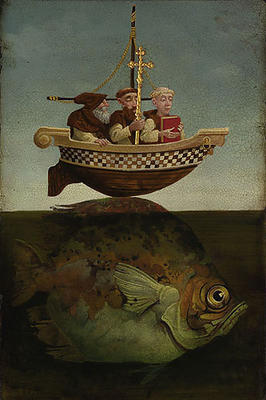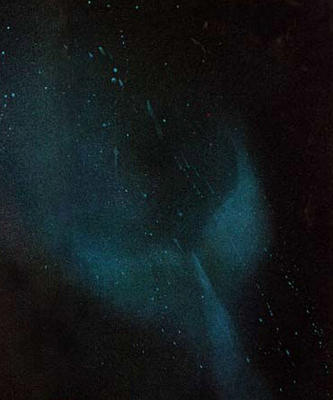On, Voyager

The first artistic representation of Orpheus appears around 600 BC, as part of a relief sculpture from a treasury at Sicyon, a town in northwestern Pelopnnese. It has Orpheus standing on a ship with a lute in his hand, and his name written next to the figure. The ship is assumed to be the Argo, thus a reference to Jason's adventures in search of the golden fleece. Orpheus travels along with Jason as an argonaut because his song can charm gulls and fishes.
PEREGRINI
Clearly I am no more salted
by your disquieting gaze
than any other man
to stare too long offshore.
Look: the far islands are
reliquaries of desire,
each wave ferrying
a saintly skull or dark
pelvis bone from sands
we once walked
together on. Between
the fourth and fifth
centuries of our age
the drifting uni-boats
were legion, each
ruddered by a
man in exile,
his eyes faint upon
the vast blue main,
his heart that psalter
which you intone
with a voice from
every hurtful door.
That tide of saints
washed on every
lonely shore with
the same force that
would later raise
cathedrals, wave after
wave, with such
high and massive
stone. Those coracle
motions I repeat here
in daily jaunts from I
to Thou -- peregrini
of ink on paper
which leave every
known and home behind
to sing the next psalm's
distant shore, each
one wondrous as wine.
Around and far behind
me chant the shades
of such desire,
waist-high in time's
lost sands.
Fathers of my fathers,
toll with me here
this lonely matin hour
which calls every boat
from shore to shore.
Join me in this song
for ageless sailing
towards her futile,
fructive and famished door.
***
According to "The Voyage of St. Brendan," Brendan burned a book containing stories about the wonders of God's creation out of disbelief. For this reason he is sent on a voyage so as to see with his own eyes certain divine manifestations which earlier he had refused to credit. In this way he is to recover the book by refilling it with the wonders which he witnesses on his voyage. The majority of the phenomena which he comes across are related to man's actions and behaviour in this life and the circumstances consequent upon them in the Afterlife. Brendan encounters souls in hell, heaven and paradise. The astonishing and sometimes frightening experiences restore his belief.
-- Clara Strijbosch, "The Heathen Giant in the Voyage of St. Brendan"
***
In Immram Brain Bran returns from the Otherworld and relates his adventures to the people of Ireland from a boat at the shore. He writes down the poems (which form the bulk of the text) in ogham and then sails off, never to be seen again.
-- Keven Murry, "The Role of the Cuilebad in Immran Snegdgusa"
***
A poem by the bishop king of Cashel, Corma mac Cuilennain, who died in 908AD, contemplates a journey of penance on the sea:
Shall I go, O king of the Mysteries, after my fill of
cushions and music, to turn my face on the shore and my back on my native land?
Shall I cut my hand with every sort of wound on the breast of the wave which wrecks boats? Shall I leave the track of my two knees on the strand by the shore?
Shall I rake my little black curragh over the broad-breasted, glorious ocean? O King of the bright kingdom, shall I go of my own choice upon the sea?
Whether I be strong or poor, or mettlesome so as to be recounted in tales, O Christ, will you help me when it comes to going upon the wild sea?

Inexorable the tide which carries us from first sources, ever weakening that old magic music. Orpehus was at first a magician of realms, travelling back and forth on a verbal mojo which later became song, the eerie and bittersweet sound of passage beloved by women so much that even dead hearts awakened and returned. Then that sound became courtly and civil, a cultural code which many knights might use to charm their way into castles no longer on the bottoms of lakes but at their brightening rims. Down to our age when he is a whollly internal function, wooing thresholds of psyche, allowing passage down and back.
The tide carries us ever away from mythic shores toward personal ones which themselves vanish, bleaching that music into gleaming sands at first light.
So why did I eat all that sand as a child at the beach? Or why did the sight of pretty girls passing by our window fil my young heart with such desperate glee? Or how at seven years old, I'd lay on my bed and press my face into my "pillow television," watching me save a girl who had fallen into a deep lake? My history keeps delving me to that other tide which circulates the other way, back toward shores which name every hole in me Orpheus departed through.
Though days have changed greatly in the march of civilizations, our hearts have changed little or none at all. My heart is ever the boat with the man in the helm playing that infinite lyre, a song both rudder and crashing shore, augmenting all that is lost with blue meters, high airs, the witching of doors to castles and underworlds in deep waters below. It is not a poem, not even a tune, but harmonies of an infinitely darker incantation, like gleams of moonlight on a night ocean where the moon is every remembered kiss which shattered me into an infinitely wilder bliss.
***
What Perseus has to do with the Gorgon's head would never occur to anyone who did not know the myth. So it is with the individual images; they need a context, and the context is not only a myth but an individual anamnesis.
-- Jung, "The Psychological Aspects of the Kore," CW 9.1.319

HE GETS THE GIRL
As a kid I changed the world
by going into my room
and acting out James Bond:
Killing evil Blofeld
at the crack of worldwide doom
then lounging in lazy billows
with his yeasty girl.
The James Bond theme
would ease my steps
back into the real world,
a little while: Before all
the cold winds conspired
to blow me back to smithereens.
I could turn tin to gold
by placing my face
to a pillow, changing
the channel to David
Gets The Girl. I watched
a pretty girl edge round
a deep pond then fall:
I dove in and hauled
her back, her gratitude
flooding me with this
sweet, presexual warmth,
like milk straight from
gold-knockered Pussy Galore.
When the real leaves you
homeless, there's always the peel,
the pith and rind of surface cool.
I yearned and learned to
glide there lubed by
cool quaffs of Bond and
my own bouncing balls,
chasing the Laylas of La-La.
-a mystic of moments,
a bra unclasping its double
wealth, the shoosh of
jeans sliding down
their white daughters.
O splendid crucifix,
crying for immortal nails.
-That was the dance, those
Penthouse Letter-moments
where, Dear Reader, I found
what I never thought
I would personally ever
encounter. I dropped out
of the monastic mill
of college to play rock n roll,
hurling the delights
of a few nights with Becky
into the coiffed frenzies
of boogie brawn, each song
another dive in her rocking,
ululate bed- holding my guitar
like a surf-pole, casting
out these chord progressions,
humming a while, then
hauling up a solo that was
at once glittering, fierce, and
wild. At least, that's what
I sure hoped for, and tried
to live for, amid a howling
ruin of wasted hours,
initiate and annihilate
twinned in a 25-year
old boy. Rightburn, I called it,
that perfect balance
of opiates (booze, pot,
speed or coke) carrying
me out on the coracle of song,
a triangulation of
wish fulfillment, drunkenness
and balls, unsheathing a
bright blade after the
second chorus, tempered
cruel and swift and
eternally sharp. Such moments
came as frequently as
the perfect babes. Dear Reader,
it never happened, some guy
on staff wrote all that crap,
the whole fantasy of sex
and drugs and rocknroll,
knowing exactly what we all
wanted, what we prayed
for each night we walked
into a crowded bar. It
was the entire exception
to the rule that I prized
above all else, thus dooming
me to the quest for a chalice
which in truth proved
the millstone of my years.
It seems I'm always
investing in fictions
and pay dearly for them all.
Has much really changed?
Here I labor away
on this overlong, overly
autobiographical lyric
meditation, earnest as ever
to ink a gleaming fish
on white pages, the mirror
of a life deemed greater
than what it can only refract.
I'm entertaining at best
a troop of ghosts in my
own head, bandmates,
lovers, all the guys
who played James Bond,
the solemn poets. Having
written this far it's a struggle
to shift back to the day slowly
waking outside, now washes
of blue warbling along
with scattered birds.
My face always felt strange
lifting from the heavy warmth
of that pillow-TV, protesting
the effort of returns to the real.
What can you say of a life
spent voyaging the top feet of the sea?
What have I learned
but to ink obliquity?
No matter: I'm hard wired
to the James Bond theme,
walking round that deep pool
whose waters shake only what's stirred.
***
There is, one knows not what sweet mystery about the sea, whose gently awful stirrings seem to speak of some hidden soul beneath.
-- Herman Melville
To seek in the brine what is promised in heaven --
anyone with sense can plainly see the madness of it.
Vitae Sanctorum,, II, 293
What everybody in the group shares in a hidden way, or needs to share, comes to expression in a writer. It is as if works of imaginative literature were a set of dails on the front of society where we can read off the concealed energies. What happens in the imagination of those individuals chosen by the unconscious part of society to be its writers, is closely indicative of what is happepning to the hidden energies of the society as a whole.
-- Ted Hughes, "Concealed Energies," in Winter Pollen
"... Knowledge of the Trinity is porpperly likened to the depths of the sea, according to that saying of the sage, 'And the great deep, who shall find it out?' If then a man wishes to know the deepest ocean of divine understanding, let him first if he is able scan that visible sea, and the less he finds himself to understand of those creatures that lurk below the waves, the more let him realize that he can know less of the depths of its creator."
-- St. Columbani, Sancti Columbani
How deep would your knowledge fain to go? When the crew of the Pequod have caught their first whale, the head is cut off and tied to the ship -- later it will be mined for the spermacetti trapped in the honeycombs of its skull -- while the crew works at stripping the blubber from the corpse and boiling it down for the whale oil. After the crew retires below decks, Ahab comes upon on the deck and contemplates the massive had hanging there, as if he were Hamlet observing the huge skull of the jester Yorick:)
It was a black and hooded head, and hanging there in the midst of so intense a calm, it seemed the sphynx's in the desert. "Speak, thou vast and venerable head," muttered Ahab, "which, though ungarnished with a beard, yet hear and there lookest hoary with mosses; speak, mighty head, and tell us the secret thing that is within thee. Of all divers, thou hast dived the deepest. The head upon which now the upper sun now gleams, has moved amid the world's foundations, where unrecorded names and navies rust, and untold hopes and anchors rot, where in her murderous hold this frigate earth is ballasted with bones of millions of the drowned. There, in the awful water land, there was thy most familiar home. Thou hast been where bell or diver never went, hast slept by many a sailor's side, where sleepless mothers would give their lives to lay them down. Thou saw'st the locked lovers leaping from their flaming ship; heart to heart they sank beneath the exulting wave; true to each other, when heaven seemed false to them. Thou saw'st the murdered mate when tossed by pirates from the midnight deck; for hours he fell into the deeper midnight of the insensate maw; and his murderers still sailed on unharmed -- while swift lightnings shivered the neighboring ship that would have borne a righteous husband to outstretched, longing arms. O head! thou hast seen enough to make an infidel of Abraham, and no syllable is thine!
-- Melville, Moby Dick, 339-340

LOVE SONG
Ranier Maria Rilke
transl. Edward Snow
How shall I keep my soul
from touching yours? How shall
I lift it over you toward other things?
Ah, I would like to lodge it
in the dark with some lost thing
on some foreign silent place
that doesn't tremble, when your depths stir.
Yet everything that touches you and me
takes us together like a bow's stroke
that from two strings draws one voice.
Across what instrument are we stretched taut?
And what player holds us in his hand?
O sweet song.

SEA LABYRINTH
Just beneath my trackless
ocean course between
this lonely shore and you
there lies a labyrinth,
an ancient code of your travail
which I enter as I launch
and wander as I sail,
finding the next isle
at its center not quite
sea or land but both
& you fresh gone,
the water in the well
there almost burning
with your blue, harrowing
the dregs of my
every lost carouse in you.
My job as I see it
from this chair today
is to make that
circuit canonical
and nude, an abbot
with his psalter
intoning lines over
singing wavelets
with nipples bigger
than I have mouth:
that in those Nones of
stern devout your
gauzy peachy salt-
glazed Nietzschean
may pulses a bossa
rum sashay,
causing archangels
to go stout and
clamor for a fall
down to the
saltiest names
of God. I see 'em just
beyond the breakers
tumbling in a row,
those pairs of blessed
ankles and pale soles
vanishing in blue,
each like a book
tossed on the wave,
another vespering
poem. My job is
sound the depth
of that well
and count every bed
that's lost down there,
each an inkling
of desire,
an arrow's shiver
up the mortal sense
that you're staring
back up from that murk,
imploring all my seed
and ink and nouns.
My job's to make
that view a shore
enfolded by incessant
tide, each wave an
antiphon and greeting
and taunt to mount
the coracle again
and chance once
more the main's
desperately empty dazzle
with that spiral
dancing floor hidden
a mile of fathoms down
where gods and whales
and undressed lovers
sport and roam. Each
plunge and peramble
here comes to you
at last, or at least
that resonance
which hallows these
ears and haunts
my turn back home.
Each return is to
some higher deeper
ground where even
less is known and
the tide pounds harder,
like a kiss, a clench,
the next blue
widening door.
(For the full peregrination, go to www.immrama.blogspot.com and sail the archives.)


<< Home